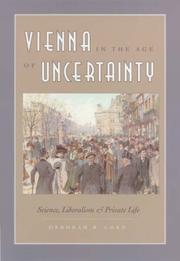| Listing 1 - 5 of 5 |
Sort by
|

ISBN: 0226111725 9780226111728 Year: 2007 Publisher: Chicago University of Chicago press
Abstract | Keywords | Export | Availability | Bookmark
 Loading...
Loading...Choose an application
- Reference Manager
- EndNote
- RefWorks (Direct export to RefWorks)
Intellectuals --- Exner family. --- Vienna (Austria) --- Vienna (Austria) --- Intellectual life.
Book
ISBN: 1283733285 0226111830 9780226111834 9781283733281 9780226111810 0226111814 Year: 2013 Publisher: Chicago London The University of Chicago Press
Abstract | Keywords | Export | Availability | Bookmark
 Loading...
Loading...Choose an application
- Reference Manager
- EndNote
- RefWorks (Direct export to RefWorks)
Earthquakes have taught us much about our planet's hidden structure and the forces that have shaped it. This knowledge rests not only on the recordings of seismographs but also on the observations of eyewitnesses to destruction. During the nineteenth century, a scientific description of an earthquake was built of stories-stories from as many people in as many situations as possible. Sometimes their stories told of fear and devastation, sometimes of wonder and excitement. In The Earthquake Observers, Deborah R. Coen acquaints readers not only with the century's most eloquent seismic commentators, including Alexander von Humboldt, Charles Darwin, Mark Twain, Charles Dickens, Karl Kraus, Ernst Mach, John Muir, and William James, but also with countless other citizen-observers, many of whom were women. Coen explains how observing networks transformed an instant of panic and confusion into a field for scientific research, turning earthquakes into natural experiments at the nexus of the physical and human sciences. Seismology abandoned this project of citizen science with the introduction of the Richter Scale in the 1930s, only to revive it in the twenty-first century in the face of new hazards and uncertainties. The Earthquake Observers tells the history of this interrupted dialogue between scientists and citizens about living with environmental risk.
Earthquakes --- Seismology --- Observations --- History --- History. --- earthquakes, destruction, natural disasters, alexander von humboldt, charles darwin, mark twain, chalres dickens, karl kraus, ernst mach, john muir, william james, women, gender, memoir, scientific research, physical sciences, geology, citizen science, richter scale, nature, environment, environmentalism, nonfiction, seismology, history, scotland, switzerland, hazard, danger, panic, confusion, fault lines, tectonic plates, austria, california, conservation, preservation, stem.
Book
ISBN: 022655502X Year: 2018 Publisher: Chicago : University of Chicago Press,
Abstract | Keywords | Export | Availability | Bookmark
 Loading...
Loading...Choose an application
- Reference Manager
- EndNote
- RefWorks (Direct export to RefWorks)
Today, predicting the impact of human activities on the earth's climate hinges on tracking interactions among phenomena of radically different dimensions, from the molecular to the planetary. Climate in Motion shows that this multiscalar, multicausal framework emerged well before computers and satellites. Extending the history of modern climate science back into the nineteenth century, Deborah R. Coen uncovers its roots in the politics of empire-building in central and eastern Europe. She argues that essential elements of the modern understanding of climate arose as a means of thinking across scales in a state-the multinational Habsburg Monarchy, a patchwork of medieval kingdoms and modern laws-where such thinking was a political imperative. Led by Julius Hann in Vienna, Habsburg scientists were the first to investigate precisely how local winds and storms might be related to the general circulation of the earth's atmosphere as a whole. Linking Habsburg climatology to the political and artistic experiments of late imperial Austria, Coen grounds the seemingly esoteric science of the atmosphere in the everyday experiences of an earlier era of globalization. Climate in Motion presents the history of modern climate science as a history of "scaling"-that is, the embodied work of moving between different frameworks for measuring the world. In this way, it offers a critical historical perspective on the concepts of scale that structure thinking about the climate crisis today and the range of possibilities for responding to it.
Climatology --- Climatology --- Science --- Science --- Research --- History --- History --- Political aspects --- Austria --- Intellectual life --- Anthropocene. --- Austria. --- Habsburg. --- atmosphere. --- climate. --- climatology. --- empire. --- physics. --- scale.
Book

ISBN: 3110373777 3110312581 9783110312584 3110312492 9783110312492 311031259X 9783110312591 9781306570336 1306570336 9783110373776 Year: 2014 Publisher: München Wien
Abstract | Keywords | Export | Availability | Bookmark
 Loading...
Loading...Choose an application
- Reference Manager
- EndNote
- RefWorks (Direct export to RefWorks)
Catastrophic scenarios dominate our contemporary mindset. Catastrophic events and predictions have spurred new interest in re-examining the history of earlier disasters and the social and conceptual resources they have mobilized. The essays gathered in this volume reconsider the history and theory of different catastrophes and their aftermath. The emphasis is on the need to distance this process of reconsideration from previous teleological representations of catastrophes as an endpoint, and to begin considering their "operative" aspects, which unmask the nature of social and political structures. Among the essays in this volume are analyses, by leading scholars in their respective fields, concerning the role of catastrophes in theology, in the history of industrial accidents, in theory of history, in the history of law, in "catastrophe films", in the history of cybernetics, in post-Holocaust discussions of reparations, and in climate change.
Disasters --- Calamities --- Catastrophes --- Curiosities and wonders --- Accidents --- Hazardous geographic environments --- History. --- Social aspects. --- History --- Social aspects --- E-books
Book

ISBN: 9783777426969 Year: 2016 Publisher: München Hirmer
Abstract | Keywords | Export | Availability | Bookmark
 Loading...
Loading...Choose an application
- Reference Manager
- EndNote
- RefWorks (Direct export to RefWorks)
Art --- art [discipline] --- anti-modernism --- Modernist --- anno 1900-1999 --- Salzburg
| Listing 1 - 5 of 5 |
Sort by
|

 Search
Search Feedback
Feedback About UniCat
About UniCat  Help
Help News
News